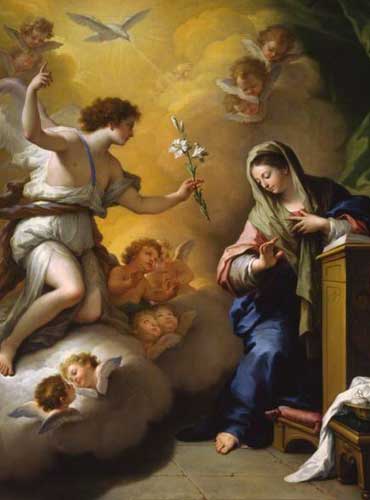The Annunciation – March 25th
Today we celebrate the solemnity of the Annunciation, the day when the Word became Flesh. There is a lot to be said about the mystery of the Annunciation, but we could summarize by saying it is a mystery of humility, a mystery of freedom, and a mystery of love.
The Annunciation is a mystery of humility; we could say that every aspect of it speaks to us of this most important virtue. We have the humility of Jesus Christ who, “though He in the form of God,” as Saint Paul tells the Philippians (2:6-8), “[He] did not regard equality with God something to be grasped. Rather, he emptied himself, taking the form of a slave, coming in human likeness; and found human in appearance, he humbled himself, becoming obedient to death, even death on a cross.” We have Mary’s humble submission to God: “Be it done unto me according to your word.” We also have our humility; if God sent a Redeemer to the world, it was because the world has sinned and was messed up. We need a savior because we are sinners, and we must acknowledge and accept that. As the author G. K. Chesterton put it, “Since that day [of the Annunciation] it has never been quite enough to say that God is in his heaven and all is right with the world; since the rumor that God had left his heavens to set it right.” We can ask ourselves: how well do we strive to live out the humility of the Annunciation is our own lives?
Secondly, the Annunciation is a mystery of freedom. On one hand, we have Christ’s freedom: nothing forced Him to come and become man for our sake. He freely gave Himself up for us, and became man, sharing in all man’s sorrows and difficulties, in order to save us. Likewise, we have Mary’s cooperation with God and His plan, a cooperation that is freely given, not something that He forces her to give. God asks for her permission to work in her life. We also have ourselves: we too are free to cooperate with God’s plan or not. How well do we strive to surrender our freedom to God, a surrender that, rather than enslave us, frees us to truly live out our dignity as sons and daughters of God?
Lastly, the Annunciation is a mystery of love. We have Christ’s presence among us, and this because “God so loved the world, that He sent His only-begotten Son.” The purpose for the Incarnation was to save sinners, and we are those sinners whom God loved so much to send His Son. Just as soon as our first parents fell, even before God spoke of punishment, He spoke of how He would save us. We also have Mary’s love; in her acceptance of her role as Mother of God, she also embraces each one of us, to bring us to new birth through Her son. Certainly at the Annunciation she didn’t know everything that would entail: as time went on, she would become more and more aware of it, through the Prophecy of Simeon, her own prayer with God, and her dealings with Christ her Son, but she would only fully know the price on Calvary. And that’s the way love is: it is unconditional, fully accepting the cost in advance. Is our love for God like that: unconditional, and ready for any challenge or struggle that might come our way?
Today, as we celebrate this great solemnity of the Annunciation, let us ask, through the intercession of Mary, the Handmaid of the Lord, for the graces of humility, surrender, and love, so that we might imitate Mary and become like “other Incarnations of the Word.”





